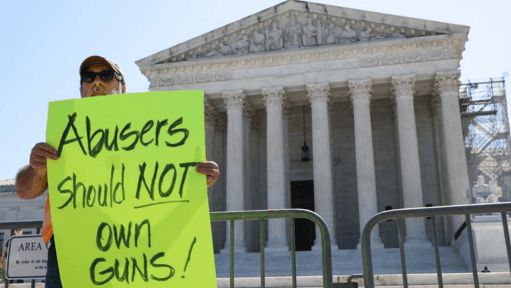
US Supreme Court Upholds Federal Domestic-Violence Gun Ban: Victory to Biden
The 8-1 decision affirms constitutionally of 1994 US law
The US Supreme Court upheld a federal law that makes it a crime for people under domestic violence restraining orders to have guns, handing a victory to President Joe Biden's administration as the justices opted not to further widen firearms rights after a major expansion in 2022.
The 8-1 ruling, authored by conservative Chief Justice John Roberts, overturned a lower court's decision striking down the 1994 law as a violation of the US Constitution's Second Amendment right to "keep and bear arms."
The law was challenged by a Texas man who was subject to a restraining order for assaulting his girlfriend in a car park and later threatening to shoot her.
The New Orleans-based 5th US Circuit Court of Appeals had concluded that the measure failed the Supreme Court's stringent test set in 2022 that required gun laws to be "consistent with the nation's historical tradition of firearm regulation" to comply with the Second Amendment.
But Roberts wrote that since the nation's founding, firearm laws have targeted people who threaten physical harm to others.
"When a restraining order contains a finding that an individual poses a credible threat to the physical safety of an intimate partner, that individual may -- consistent with the Second Amendment -- be banned from possessing firearms while the order is in effect," Roberts wrote.
Biden's administration defended the law as critical to protect public safety and abuse victims, who often are women.
"No one who has been abused should have to worry about their abuser getting a gun," Biden said, touting his record on gun control. "As a result of (Friday's) ruling, survivors of domestic violence and their families will still be able to count on critical protections, just as they have for the past three decades."
Conservative Justice Clarence Thomas, who authored the 2022 ruling in a case called New York State Rifle and Pistol Association v. Bruen, was the lone dissenter.
"Not a single historical regulation justifies the statute at issue," Thomas wrote, adding that "in the interest of ensuring the government can regulate one subset of society, (Friday's) decision puts at risk the Second Amendment rights of many more."
The case involved Zackey Rahimi, who pleaded guilty in 2021 to illegally possessing guns in violation of this law while subject to a restraining order.
Police found a pistol and rifle while searching Rahimi's residence in connection with at least five shootings, including using an assault-type rifle to fire at the home of a man to whom he had sold drugs.
A federal judge had rejected Rahimi's Second Amendment challenge and sentenced him to more than six years in prison before the case went to the 5th Circuit.
Violating this law was punishable by up to 10 years in prison at the time of Rahimi's indictment but has since been raised to 15 years.
'A Sigh of Relief
Gun control advocates welcomed Friday's ruling. "As millions of domestic violence victims breathe a sigh of relief, it's worth remembering who put them in jeopardy: extreme Trump-appointed judges on the 5th Circuit who sided with an abuser who wanted to keep his guns," said John Feinblatt, president of Everytown for Gun Safety, referring to Republican former President Donald Trump.
Rahimi's lawyer declined to comment. In a nation bitterly divided over how to address firearms violence including frequent mass shootings, the Supreme Court often has taken an expansive view of the Second Amendment.
It broadened gun rights in landmark rulings in 2008 and 2010 before the 2022 Bruen decision, which recognised a constitutional right to carry a handgun in public for self-defence and struck down New York state's limits on carrying concealed handguns.
In Friday's ruling, Roberts made clear that the history and tradition test set in Bruen for gun regulations is not as inflexible as the 5th Circuit's ruling and Thomas's dissent suggested.
Roberts said that under the Bruen precedent, modern gun restrictions do not require a "historical twin" in order to be lawful.
Five justices who joined the majority in the ruling wrote concurring opinions, reflecting a vigorous debate over the workability of the Bruen test. Liberal Justice Ketanji Brown Jackson said the Rahimi case demonstrated that lower courts are struggling to apply the Bruen tenets.
"In my view, the blame may lie with us, not with them," Jackson wrote. In another firearms-related decision, the Supreme Court on June 14, declared unlawful a federal ban on "bump stock" devices that enable semi-automatic weapons to fire rapidly like machine guns, although that case did not involve the Second Amendment.
In a May Reuters/Ipsos poll, 75 per cent of registered voters, including 84 per cent of Democrats and 70 per cent of Republicans, said that a person subject to a domestic violence restraining order should not be allowed to possess firearms.
For any enquiries or information, contact ask@tlr.ae or call us on +971 52 644 3004. Follow The Law Reporters on WhatsApp Channels.